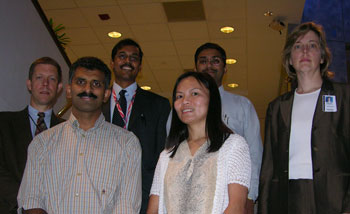 |
The first cohort of UNMC Clinical and Translational Research Mentored Scholars are: back row from left — Jason Johanning, M.D.; Prasad Padala, M.D.; Apar Ganti, M.D.; and Deborah Darrington, M.D.; front row from left — Srikar Adhikari, M.D., and Chi Lin, M.D. |
The physicians, who come from various specialties around the UNMC campus, are the first participants in the post graduate level training designed to make medical center scientists competent in translating their research from the laboratory to the clinic or from the clinic to the community using multi-disciplinary approaches.
The training also emphasizes the value of working with excellent mentors from UNMC and beyond.
“The overall goal of this training track is that when you finish, you will be competent and independent clinical investigators,” said Fausto Loberiza Jr., M.D., an associate professor in the College of Medicine and program director who coordinated the design of the training track after extensive discussions with faculty members from various colleges at UNMC, the University of Nebraska-Lincoln and Girls and Boys Town.
The training track was introduced as part of UNMC’s increased emphasis on clinical and translational research — a top priority on UNMC’s strategic plan.
“This is truly a new day at UNMC,” said Jennifer Larsen, M.D., associate dean for clinical research in the College of Medicine. “Your cohort will be the first group to really take this message of clinical and translational research to the rest of the campus.”
The inaugural participants are:
- Srikar Adhikari, M.D., assistant professor of emergency medicine;
- Deborah Darrington, M.D., assistant professor of oncology;
- Apar Ganti, M.D., assistant professor of oncology;
- Jason Johanning, M.D., associate professor of vascular surgery;
- Chi Lin, M.D., assistant professor of radiation oncology; and
- Prasad Padala, M.D., assistant professor of psychiatry.
In their study, the scholars will complement their knowledge of their respective fields of specialty with skills in conducting sound and ethical clinical research to become principal investigators.
The track is at least a two-year program of course work and includes an intensive mentored research project. The training program is patterned after existing programs at major U.S. medical centers.
The training process will expose scholars to the concepts and methods that emphasize multidisciplinary approaches to clinical and translational research.
During Monday’s orientation, the cohort met with several of the track’s graduate advisers, including Lani Zimmerman, Ph.D., professor in the College of Nursing; Debra Romberger, M.D., professor in the College of Medicine; Ted Mikuls, M.D., associate professor in the College of Medicine, Helen McIlvain, Ph.D., professor in the College of Medicine; as well as Drs. Larsen and Loberiza.
Also in attendance was Patricia Leuschen, Ph.D., professor and co-chair of the MSIA program in UNMC’s graduate school, who Dr. Loberiza said was a key consultant in the development of the new training track. The education piece of the new track is administered through the MSIA program.
In their first few months of training scholars will work on assembling teams of mentors who will assist with their research projects.
The advisers urged the scholars to choose mentors who will make assisting the cohort researchers a priority.
“The best mentor-mentee relationships are formal,” Dr. Mikuls said. “By that I mean that the mentor and mentee have dedicated time to spend discussing the mentee’s project. If you’re just discussing your project with your mentor as you pass each other in a hallway, that’s probably not going to cut it.”